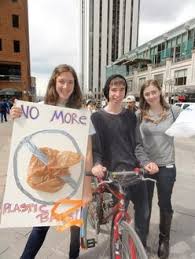Posts tagged Jamie Harkins

Fee makes big dent in disposable bag use
Mar 10th
After six months in effect, estimates show that the disposable bag fee has reduced use of paper and plastic checkout bags at grocery stores in Boulder by 68 percent. This reduction means the community has kept nearly 5 million disposable bags out of the waste stream since the fee went into effect on July 1, 2013.
“This is very positive news,” said Jamie Harkins, City of Boulder business sustainability specialist. “The bag fee arose from community concerns about the negative environmental and economic impacts of disposable bags in Boulder, and this progress report shows that we are addressing those concerns and doing so effectively.”
The disposable bag fee is one of several city initiatives aimed at bringing Boulder closer to its goal of becoming a zero waste community and diverting 85 percent of the waste stream away from the landfill and into recycling, composting and reuse facilities.
Of the approximately 22 million disposable checkout bags Boulder uses each year, 60 to 70 percent come from grocery stores. A study conducted by consultant TischlerBise in 2012 projected a 50 percent reduction in disposable bag use by the end of the first year of the fee, with approximately 3.6 million disposable bags subject to the fee (i.e. purchased) in the first six months. In actuality, Boulder shoppers have reduced disposable bag use by 68 percent and have purchased significantly fewer bags, approximately 2.3 million in total.
Of the 10 cents collected for each bag, 4 cents goes directly to retailers to defray fee implementation costs. The remaining 6 cents is remitted to the city to support education and outreach efforts about the bag fee as well as to cover expenses associated with providing bags to portions of the population that might be disproportionately impacted by the fee. No revenue collected as part of the fee program can be used to support General Fund services or programs.
The disposable bag fee does not apply to bags used inside stores for items such as produce, bulk food, or meat and fish, and does not apply to pharmacy prescriptions or newspapers.
–CITY–






















